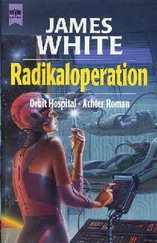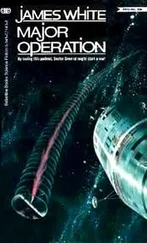that should not have happened—”
It broke off for a moment, then with a sudden burst of emotion intense enough to make Prilicla tremble it said, “Are you thinking what I’m thinking?”
“We’re not telepaths, friend Fletcher,” said Prilicla gently. “You’ll have to tell us what you’re thinking.”
“I’d rather not tell you anything just yet,” said the captain, 'in case I’d be making a complete fool of myself.” It reached into its equipment satchel and indicated one of the consoles whose plastic trim was only slightly heat-discolored. “There may still be some life left in that one. Instead of talking to you, maybe I’ll be able to demonstrate my idea with this tester. The instrument has a small screen so you’ll have to move closer. But don’t touch it, or allow any of your equipment to make contact with it. That is very important. Do you understood?”
“We understand, friend Fletcher,” said Prilicla. “We think,” Murchison added.
With the pathologist’s feeling of bewilderment matching his own they watched in silence as the captain expertly removed the console cover to lay bare the underlying circuitry. Then with a magnetic clamp it attached the tester to a convenient bulkhead, activated the display screen, unreeled one of the device’s many probes, and went slowly and carefully to work. If it had been a sick patient rather than a malfunctioning machine, Prilicla thought, the other’s movements could not have been more delicate or precise.
Many minutes passed while the display screen remained lit but blank, then suddenly it flickered and a schematic diagram appeared. The captain bent closer, excitement diluting its intense concentration.
“I’m into the ship’s main computer now,” it said, “and there’s something there. But I don’t recognize the… What the hell!”
The image was breaking up and generating random, geometrical lines and shapes that were drifting off the four edges of the screen until all that remained was an expanse of sparkling white noise. The captain swore and jabbed at several of its control studs without result. Even the green POWER ON light was dead.
The type and intensity of the captain’s emotional radiation was beginning to worry Prilicla. He said, “Something has happened, friend Fletcher. What is troubling you?”
“My tester just died,” said the captain. Suddenly it grabbed the instrument in both hands, raised it high above its head and slammed it downwards with all of its strength against the deck before adding, “And I was expecting it to happen, dammit!”
“Temper, Captain,” said Murchison, radiating irritation and surprise as it bent down to pick up the remains of the device.
“No!” said Fletcher urgently. “Stay away from it. Probably there’s no physical danger to yourselves because it’s dead, defunct. But don’t touch it until we know the technical reason for what happened here.”
“Which was what?” said Prilicla.
He spoke very gently because the other’s feelings were confused, fearful, excited, and radiating all over the emotional spectrum. It was an unprecedented mental condition for the usually calm and imperturbable captain to display. Murchison’s feeling irritation at the other’s brusque manner was being replaced by the. clinical calm of a physician towards someone who might shortly become a patient. But before the captain could reply, there was an interruption from Naydrad speaking on their headsets.
“Dr. Prilicla,” it said. “One of the casualties, the last one you brought in, has returned to partial consciousness. Judging by its manner, it was the ship’s commanding officer. It is greatly agitated, its speech is slurred and unintelligible, and, in spite of being immobilized, it is fighting all attempts at administering further sedative shots. The self-inflicted additional trauma is causing a marked deterioration in its clinical condition. If we patch you through, will you speak to it? Or better still, come back here and try your projective empathy on its mind?”
While the charge nurse was speaking, Prilicla had been trying not to tremble at the thought of what the severely burned and prematurely conscious patient was doing to itself. He said, “Of course, friend Naydrad. I’ll talk to it now and while I’m flying back to join you. If it is Terragar’s captain, then Rhabwar will have its family and personal names on file. Quickly, please, find out what they are. Using them in conversation will help reassure it, but I’ll speak to it now.”
“No,” said Fletcher. “I know his name. Let me talk to him.”
He felt Murchison’s earlier calm disappear in an uncharacteristic flare of anger as it said, “What the hell’s got into you, Captain? This is a clinical matter. It is definitely not in your area of expertise.”
Both of their faces were showing the reddening of temporarily elevated blood pressure, but the anger of the captain was being overlaid by feelings of increasing certainty as it said, “Sorry, ma’am. In this case it is, because right now I’m the only one here who knows what happened.”
The captain was not allowing the intense sympathy and concern it was feeling to affect the calm, unemotional tone of its voice as it spoke via the communicator screen to the patient, but considering the urgency of the situation, Prilicla thought that friend Fletcher’s long-range bedside manner was very good.
“Captain Davidson, George,” it began. “This is Don Fletcher, Rhabwar. We were able to land your ship, cool it in the sea, and recover your crew. Apart from the burn injuries, which ire severe, you are in no immediate danger, and — please believe me — neither are we…”
No sentient creature, Prilicla thought as an uncontrollable tremor shook his body, should ever have to suffer such an intensity of pain, much less have to fight through it in an attempt to produce coherent words. The captain’s voice remained steady but its normally pink, Earth-human face had paled to a bloodless yellow-grey.
“George,” it went on, “please stop threshing about in that litter and trying to fight your medication, and most of all, stop trying to talk. Believe me, we know what is troubling you and what you’re trying to warn us about, and we appreciate the effort. But right now you must relax and just listen to me…”
Captain Davidson was still trying desperately to talk rather, listen, but its words lacked coherency even to the listeners of its own species who did not need translators. The high levels of pain and fear and urgency it was feeling had not diminished.
“… We received and understood the hand signals and emotional radiation from your control canopy,” the captain went on, with a nod towards Prilicla, “and at no time was direct physical contact made by Rhabwar either with Terragar or the alien ship, and that situation will continue until the threat is fully understood. In the meantime Rhabwar has been positioned at a safe distance along the beach from this medical station that we have deployed to treat your survivors, and the remains of your ship are also at a safe distance from both. Following the recovery of your casualties, Terragar was boarded again and your ship interior and the remains of the alien robot we found on board were thoroughly investigated. As a result we know the reason for your desperate and apparently suicidal attempts to avoid contact with our own ship. We deeply appreciate what you were trying to do and tell us, but now we have received the message and probably know more about the threat from that alien ship than you do.”
Prilicla detected the change in emotional radiation several seconds before Danalta spoke.
“The patient’s struggles have diminished slightly,” the shape-changer reported quietly without looking up from the patient. “It is no longer trying to speak, but the monitor indicates continued muscular tension and elevated blood pressure. You are getting through to it, Captain. I don’t understand one word of your explanation, but for the patient’s sake, keep on talking.” From the evidence so far uncovered,” Fletcher went on, ignoring the compliment and at the same time trying to reduce Danalta’s level of ignorance, “I would say that the robot was floating free outside the other ship’s hull and you recovered it hoping that it might be a survivor or, if not, that it would at least give you some idea of the form of life you were trying to rescue. When they didn’t respond to your radio signals, you sent across contact-sensor plate and connecting cable which you attached magnetically to the hull, hoping that it would be able to detect life signs or movements that your computer would be able to process to give the exact locations. But it was the direct cable connection between the sensor plate and your computer that wrecked Terragar, In short, George, that alien vessel doesn’t affect or infect living people, it kills ships. It also infects, disables, or kills any lesser form of computer-controlled device that comes into contact with it.
Читать дальше












